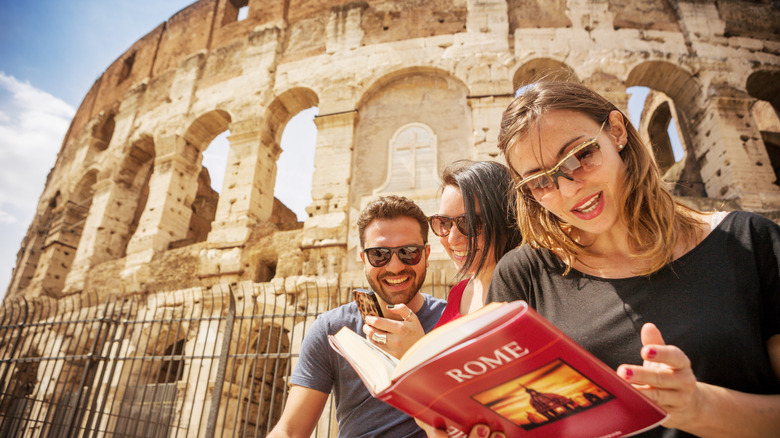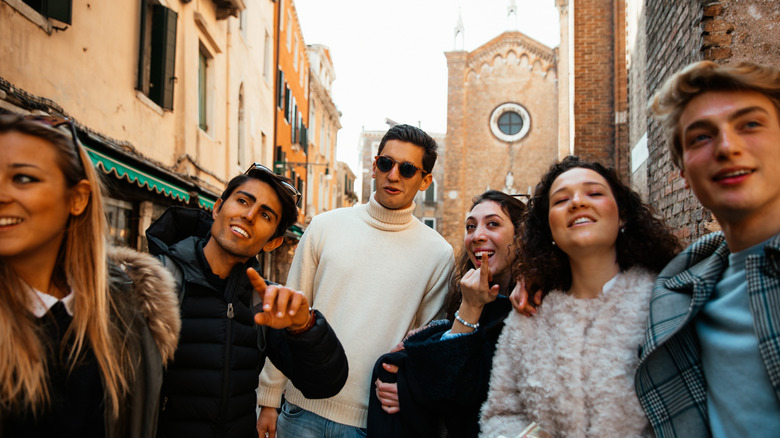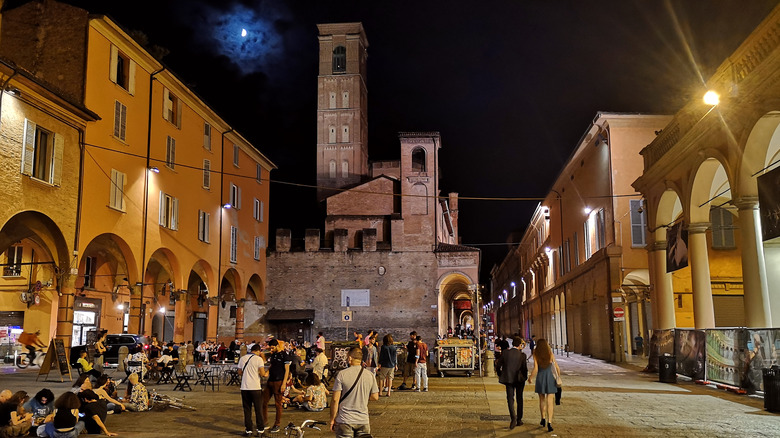The Best, Most Fun Way To Communicate With Locals In Italy, According To Rick Steves
Italians have a very animated style of communication. In addition to a beautiful language, Italian conversations often involve grand gestures with the hands and arms, strong facial expressions, and big smiles. Even if you don't speak Italian, it can be wonderful to just sit and observe others chatting while enjoying a gelato. As European travel pro Rick Steves says on his website, while he's not great at other languages, that's his favorite place to communicate.
"Nowhere do I have more fun than communicating than in Italy," he wrote. "Because Italians are so outgoing and their language is such fun, interactions are a pleasure." However, there is one type of communication in Italy that tops it all, and for Steves, that's the "passeggiata" (pronounced "pass-uh-gee-ah-tah"). It's an early evening event of sorts where people promenade along the local streets, showing off, flirting, or just enjoying the sights.
For Americans, there may be a few parts of it that feel a little crass, but it's a longstanding tradition. Steves suggests this is "one of the best ways to observe Italians communicating — and to communicate with them." Here's what you need to know about the passeggiata, what you might see and hear, and some more tips for chatting with locals in Italy.
All about the passeggiata in Italy
There are plenty of things to learn before you go, like which myths about Italy to discard and not knowing about the hydration mistake lots of tourists make. The passeggiata, however, you might have heard about. The form we usually see in films, like the beginning of the Rome montage in "Eat Pray Love," usually involves men following women down the street, shouting and gesturing. While that can happen anywhere in the world, that's not the whole story. Steves explains that in smaller towns, when people promenade, you might hear "sweet whispers of 'bella' (pretty) and 'bello' (handsome)," as everyone walks around to be seen. However, things are a bit different in Rome.
Steves tells us that the Roman version can sometimes be called "struscio" or "the grind." He says, "Younger participants utter the words 'buona' and 'buono' — meaning, roughly, 'tasty.' As my Italian friend explained, ”Bella' is a woman you admire — without touching. 'Buona' is something you want, something... consumable. 'Bella' is too kind for this struscio.'"
The word "passeggiata" comes from the Italian word for "walk," and Sunday is the big day for it. You'll certainly find flirting during the passeggiata, but you'll also see people discussing the politics of the day, some window shopping, friends catching up, or just people parading their newest outfits past other residents. You can participate with a walk through the square or just sit with a glass of wine and observe.
More communication tips for Italy
If you decide to join the passeggiata, dress the part. Steves has some clothing tips to look like a local in Europe, but first and foremost, skip the touristy shorts as well as socks with sandals. This is the spot to be seen, so enjoy dressing up and heading out for the night. It's understandable if you're not comfortable with being "rated" in this way, and like any other city, sometimes people take yelling out admiration for someone else too far.
If that does happen, here are a few phrases to know. "No, grazie" (noh grat-zee) means "no, thank you." To say, "Please, don't bother me," it's, "Per favore, non disturbarmi" (pear fah-vohr-eh, non dis-tur-bar-mee). If anything gets out of hand, the word for "help" is "aiuto" (eye-you-toh).
Steves also has helpful tips for some of the body language you may see. He mentions the "cheek screw," or putting a finger on your cheek and twisting it back and forth, which means, he says, "'cute' or 'delicious.'" If you put your fingers and thumb together and point up at the sky, it's a question. Steves says, "It can also be used as an insult to say, 'You fool.'" Flick your chin with your fingers, and you've indicated that you're not interested. If you see someone doing what looks like a bicep curl with a fist and slapping that arm with the other hand, you may be about to witness an argument or fight.


